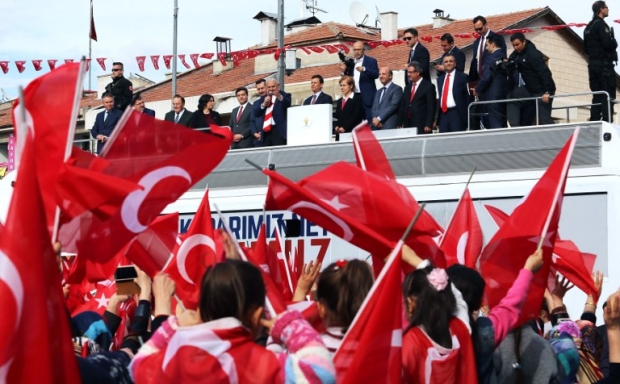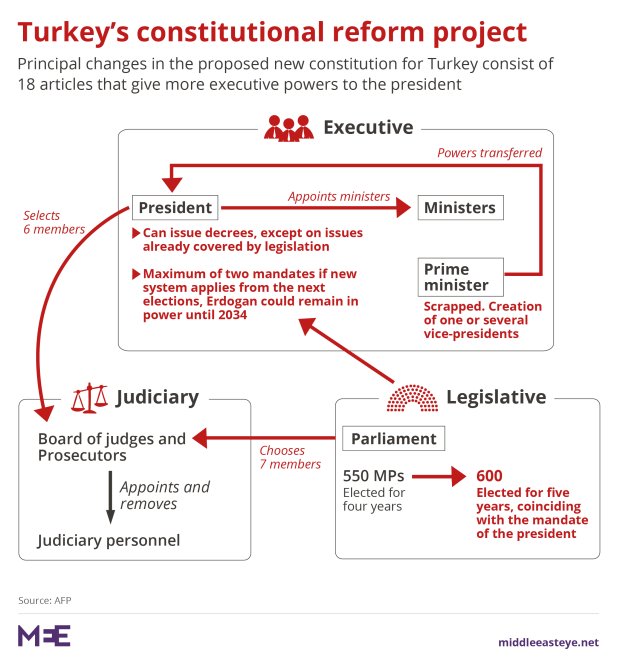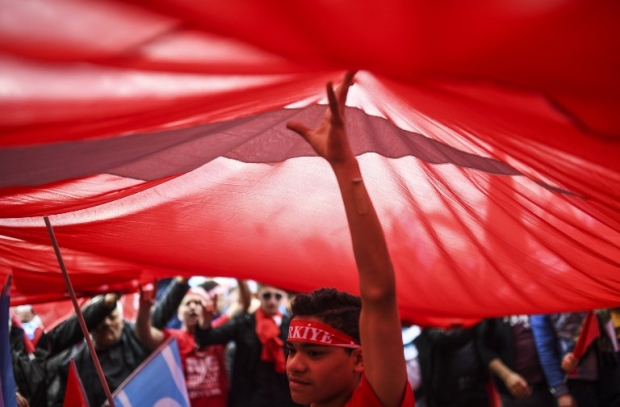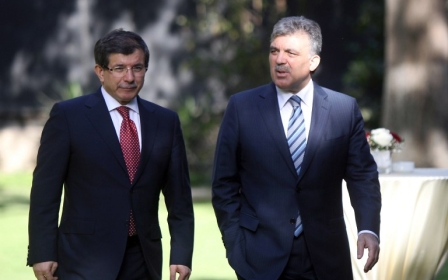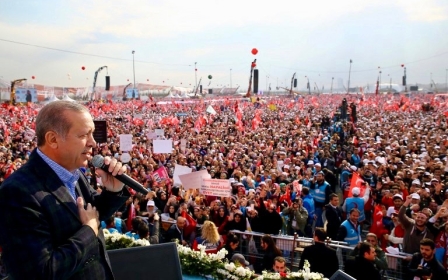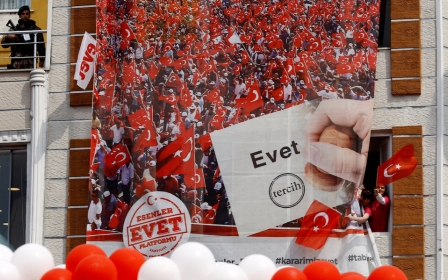Turkey votes in watershed referendum on presidency

ISTANBUL, Turkey – Turkish citizens head to polling booths on Sunday for what is possibly the biggest political decision in the country's modern history - whether to grant the president vast executive powers and move away from a parliamentary system.
This is the seventh referendum to be held since the modern Turkish republic formed in 1923 and arguably the most significant since multi-party politics were introduced in 1946. Sunday's result could also resonate far beyond Turkey’s borders.
Turkey remains a country of vital importance to the world, perhaps more so than ever. Its crucial location, a land crossing and buffer between Europe and the Middle East, and its role as the only democratic, Muslim-majority NATO member make Turkey a key component in the resolution of the Middle East's various conflicts.
How it runs itself, either as a parliamentary democracy or an executive presidency, will have clear ramifications for internal policy and its interaction with other countries.
Despite its record of backtracking on democracy and democratic freedoms in recent years, Turkey still remains the world’s major hope and example of the success and compatibility of political Islam with democracy.The Turkish people will vote on an 18-article constitutional amendments package, which was passed through parliament in January with the support of the ruling Justice and Development Party (AKP) and the right-wing Nationalist Movement Party (MHP).
For many critics of this attempt to grant the president such vast executive powers, what is also at stake is the weakening of the legislative branch. The Turkish parliament has always been the first and last line of Turkish democracy's defence, most recently witnessed last July as MPs held firm while parliament was bombed by putschists - and the erosion of judicial independence.
But supporters of the bill believe the current system in Turkey is not a fully functioning democracy. They say the judiciary is not independent of unseen influences and parliament is incapable of acting swiftly enough to serve the country's best interests.
Electoral turnout
According to data released by Turkey's election organisation body, the Supreme Election Board (YSK), more than 55 million people out of the country's nearly 80 million population are eligible to vote. In addition, nearly 3 million eligible voters reside outside Turkey able to cast their votes in 57 different countries. Voting abroad was completed last week, with 1.3 million people voting. The ballot papers have been transferred to Turkey for counting on Sunday.
A total of 167,601 polling stations have been set up across the country, mostly schools that serve as polling stations in Turkey.
A simple 50 percent plus 1 vote of all votes cast is required.
Turnout is generally high during elections and referendums in Turkey, with an average turnout of more than 80 percent in the last nine elections.
The law imposes a token financial penalty on eligible voters who do not vote. In the most recent referendum, in 2010, the penalty was 22 Turkish lira (about $8).
Polling booths in Turkey's eastern regions will open at 0700 (0500GMT) and close at 1600 (1400 GMT) local time, while ballot stations in central and western Turkey are open from 0800 (0600 GMT) to 1700 (1500 GMT). The one-hour time difference is to make maximum use of daylight.
The YSK permits results to be broadcast about two hours after the last polling booths close. Official results, however, are not declared until a few weeks later after all complaints have been processed and dealt with.
Security threats
There has been a big drop in terror attacks over the past two months following tighter security measures. Security will be at the highest level on Sunday as the country votes. However, the threat of attacks still exists.
The Islamic State (IS) group has called in the latest editions of its Turkish and Arabic-language publications for polling booths in Turkey to be attacked.
Dozens of IS suspects have been rounded up by security forces in country-wide operations during the past week.
In terms of voting irregularities and fraud, Turkey has a strong record of holding clean elections.
Apart from a few instances in remote and sparsely populated rural areas, vote-rigging is a near impossibility in the country's urban centres. This is down mainly to the use of both automated and manual vote counting. Every major political party is also allowed to install its own observers at all polling booths.
The Organisation of Security and Cooperation in Europe, a security-oriented intergovernmental organization whose mandate includes fair elections, will also have a limited observation mission in place to monitor the referendum.
'Unfair' referendum campaigning
The build up to the referendum and the campaigning process, on the other hand, was marked by many unfair practices.
The government and president – officially required to be neutral – used all the state's resources available to them to campaign in favour of the shift to an executive presidency.
Opponents of changing the system of governance were denied equal airtime and faced threats. Some were physically attacked. Government officials, including the president and prime minister, compared "no" voters to terrorists.
At the same time, state-of-emergency laws were used to prevent opponents from holding campaign rallies. Turkey has been under a state of emergency since last July's failed coup attempt. This grants the government expanded powers and provides provincial governors the right to ban public gatherings.
The various campaign activities on both sides, but particularly the side in favour of the constitutional amendments, often turned into debates about the general state of affairs. Campaign activities often included the targeting of political opponents rather than a discussion of the constitutional changes being proposed.
Previous referenda
Out of the previous six referendums that Turkey has held since 1961, three have been on new constitutions, which were voted on in 1961, 1982 and 2010. In 2007, Turkey held a referendum to vote on allowing the president to be elected by public vote. In another referendum, the country voted on lifting political activity bans imposed after the 1980 military coup.
In 1988, Turkey voted on bringing forward local elections by a year - the only referendum in Turkey's history where the public rejected the proposed change.
There is wide consensus in Turkish society that the country's coup-era 1982 constitution needs to be replaced. Previous attempts at jointly working on a new charter in parliament have failed, although the original charter has been partially amended on many occasions.
Opponents of the proposed amendments package say this set of changes being pushed by incumbent President Recep Tayyip Erdogan and the ruling Justice and Development Party (AKP) is nothing more than a route to one-man rule and authoritarianism.
Supporters reject these charges and say it is the only way forward for attaining stability and more prosperity in the country.
For many domestic and international observers of Turkey, this referendum has become more than just about a system of governance, but one that will show whether Turkey is headed toward becoming an authoritarian state in the mould of Vladimir Putin's Russia.
Even so, if Turkey's politicians over the decades have often decided to play zero-sum games domestically where compromise is not an option, the Turkish public has almost always voted in favour of moderation.
New MEE newsletter: Jerusalem Dispatch
Sign up to get the latest insights and analysis on Israel-Palestine, alongside Turkey Unpacked and other MEE newsletters
Middle East Eye delivers independent and unrivalled coverage and analysis of the Middle East, North Africa and beyond. To learn more about republishing this content and the associated fees, please fill out this form. More about MEE can be found here.



